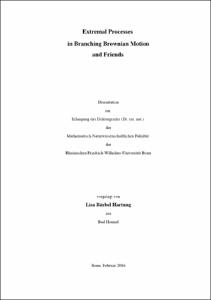Hartung, Lisa Bärbel: Extremal Processes in Branching Brownian Motion and Friends. - Bonn, 2016. - Dissertation, Rheinische Friedrich-Wilhelms-Universität Bonn.
Online-Ausgabe in bonndoc: https://nbn-resolving.org/urn:nbn:de:hbz:5n-44142
Online-Ausgabe in bonndoc: https://nbn-resolving.org/urn:nbn:de:hbz:5n-44142
@phdthesis{handle:20.500.11811/6841,
urn: https://nbn-resolving.org/urn:nbn:de:hbz:5n-44142,
author = {{Lisa Bärbel Hartung}},
title = {Extremal Processes in Branching Brownian Motion and Friends},
school = {Rheinische Friedrich-Wilhelms-Universität Bonn},
year = 2016,
month = jul,
note = {In recent years there has been increasing interest in understanding the extremal behaviour of strongly correlated systems.
We start the introduction by recalling the main results for independent, identically distributed random variables. Next, we turn to the special case of Gaussian distributed random variables. In terms of comparison this is the most relevant case for the rest of this thesis. We then move on to certain strongly correlated random variables, in particular tobranching Brownian motion (BBM) which is a key object of this thesis.
In Chapter 2 and Chapter 3 we study variable-speed branching Brownian motion. In this model each particle is a time-changed Brownian motion. In this way we allow for a richer class of possible correlation structures. In the weak correlation regime we prove the convergence of the rescaled maximum and of the extremal process.
In Chapter 4 we extend results on the extremal process of BBM. We add an additional dimension in such a way that also the information on the genealogical structure is encoded. This construction can be seen as an analogue to the 2d discrete Gaussian free field.
Chapter 5 is devoted to the study of the partition function in the complex temperature branching Brownian motion model in the glassy phase. This extends results by Madaule et al. The key ingredients are a precise understanding of the extremal process of branching Brownian motion and a clever way to compute moments of complex temperature partition functions.
In Chapter 6 we discuss the ageing phenomenon in the random energy model. This is a dynamical question concerning a certain Markov jump process in random environment. Again, a deep understanding of the extreme values of the energy landscape is needed.},
url = {https://hdl.handle.net/20.500.11811/6841}
}
urn: https://nbn-resolving.org/urn:nbn:de:hbz:5n-44142,
author = {{Lisa Bärbel Hartung}},
title = {Extremal Processes in Branching Brownian Motion and Friends},
school = {Rheinische Friedrich-Wilhelms-Universität Bonn},
year = 2016,
month = jul,
note = {In recent years there has been increasing interest in understanding the extremal behaviour of strongly correlated systems.
We start the introduction by recalling the main results for independent, identically distributed random variables. Next, we turn to the special case of Gaussian distributed random variables. In terms of comparison this is the most relevant case for the rest of this thesis. We then move on to certain strongly correlated random variables, in particular tobranching Brownian motion (BBM) which is a key object of this thesis.
In Chapter 2 and Chapter 3 we study variable-speed branching Brownian motion. In this model each particle is a time-changed Brownian motion. In this way we allow for a richer class of possible correlation structures. In the weak correlation regime we prove the convergence of the rescaled maximum and of the extremal process.
In Chapter 4 we extend results on the extremal process of BBM. We add an additional dimension in such a way that also the information on the genealogical structure is encoded. This construction can be seen as an analogue to the 2d discrete Gaussian free field.
Chapter 5 is devoted to the study of the partition function in the complex temperature branching Brownian motion model in the glassy phase. This extends results by Madaule et al. The key ingredients are a precise understanding of the extremal process of branching Brownian motion and a clever way to compute moments of complex temperature partition functions.
In Chapter 6 we discuss the ageing phenomenon in the random energy model. This is a dynamical question concerning a certain Markov jump process in random environment. Again, a deep understanding of the extreme values of the energy landscape is needed.},
url = {https://hdl.handle.net/20.500.11811/6841}
}






